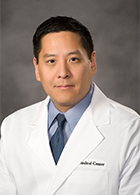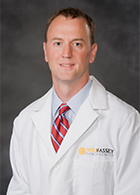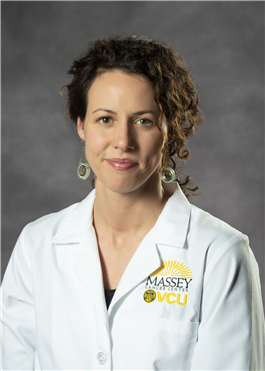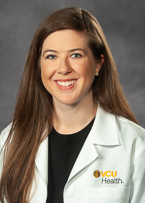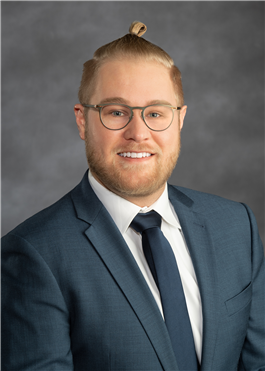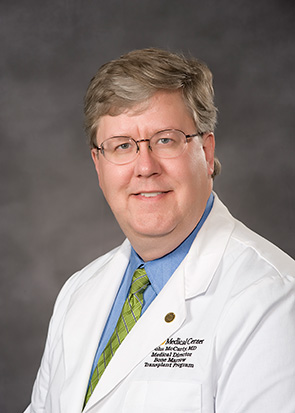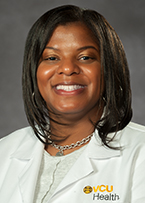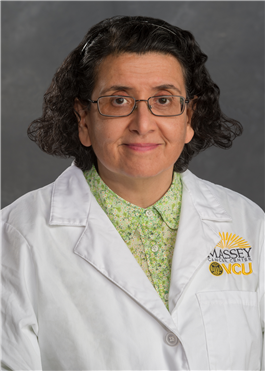At Massey, an entire team of specialists evaluates each patient to recommend a personalized treatment plan. The benefits and risks of each treatment are carefully considered and discussed with the patient. Your medical team will recommend the combination and sequence of care that is most likely to result in the best outcomes and quality of life based on your unique medical, social and emotional needs. Your cellular immunotherapy and transplant coordinator will guide you and your caregivers through each step of the process, and you will have access to comprehensive supportive care.
Treatments may include:
CAR-T therapy
CAR-T therapy is an exciting new type of immunotherapy in which a patient's T-cells, a type of immune system cell, are genetically modified in the laboratory so they will attack cancer cells. T-cells are taken from a patient’s blood through a process called apheresis, in which blood is collected from the vein, filtered and separated by a machine and then returned to the patient. Then, the gene for a special receptor that binds to a certain protein on the patient’s cancer cells is added. The special receptor is called a chimeric antigen receptor (CAR). Large numbers of the CAR-T cells are grown in the laboratory and then given to the patient by infusion.
Providing CAR-T therapies requires extensive coordination of many different clinical teams due to the complex nature and potential side effects of cellular immunotherapies. Patients treated with CAR-T therapies at Massey are required to stay in the hospital for seven days after CAR-T infusion and be within a 30-minute drive to Massey for the following month. During this time, patients are closely monitored for side effects and given exclusive and immediate access to medical care at any time for any reason.
Current CAR-T therapies
- Yescarta™ by Kite Pharmaceutical - Massey was among the first cancer care providers in the nation to offer Yescarta™ (axicabtagene ciloleucel) for adult patients with large B-cell lymphoma subtypes including diffuse large B-cell lymphoma, high grade B-cell lymphoma, primary mediastinal B-cell lymphoma, and transformed follicular lymphoma. To be eligible, patients must have received two or more other forms of cancer treatment which did not successfully treat their cancer.
- KYMRIAH™ by Novartis - KYMRIAH™ is approved by the FDA for the treatment of acute lymphoblastic leukemia in children and young adults up to 25 years old whose cancer has returned after previous treatments or has not responded to previous therapies.
- TECARTUS™ by Kite Pharmaceutical - TECARTUS™ is approved for adults with mantle cell lymphoma whose disease continues to progress despite prior treatments.
Because Massey is one of the few cancer care providers with the clinical expertise and resources to provide CAR-T therapies, we are also able to participate in clinical trials testing new and promising forms of cellular immunotherapies.
Transplantation
Massey has been providing bone marrow and stem cell transplantation options continuously since 1988. Now the largest and most comprehensive transplant provider in Virginia, our patients can receive any available transplant source and option without being referred elsewhere, including related, unrelated, autologous (self) and umbilical cord blood transplants. Good patient outcomes have helped place Massey’s Cellular Immunotherapies and Transplant program among the largest and fastest-growing programs in the nation.
During bone marrow or stem cell transplantation, a patient’s immune system is replaced with the healthy immune system of a related or unrelated donor, or with stem cells collected and stored from umbilical cord blood. First, the patient’s own blood-producing stem cells are eliminated through high-dose chemotherapy so that the new, healthy immune system can be transplanted. In autologous transplants, a patient’s own stem cells are collected before their cancer cells and blood producing stem cells are destroyed with chemotherapy. The stem cells are then given back to the patient to regrow their blood cells.
Candidates for transplantation often have various forms of blood cancers, such as leukemias, as well as sickle cell anemia and other hematologic malignancies and immune disorders. In particular, candidates are patients who have relapsed or recurrent cancer, patients whose cancer did not fully respond to standard-dose therapy and patients at a high risk for relapse with standard-dose therapy.
Our inpatient treatment unit and outpatient clinic are specifically designed for the treatment needs of transplant patients and their families, and are conveniently located in downtown Richmond on the VCU Medical Center campus with free valet parking for outpatient appointments.
A critical component of our program is our Cellular Therapeutics Lab, which allows physicians to perform procedures more specifically tailored to individual cancer patients’ needs as opposed to broadly supporting intensive, high-dose chemotherapy treatments used in bone marrow transplantation. The lab allows specific cellular elements of the patient’s or donor’s immune system to be isolated or adapted to work as a focused therapy for cancer or immune-mediated disorders, providing new hope for patients with a myriad of disease.



